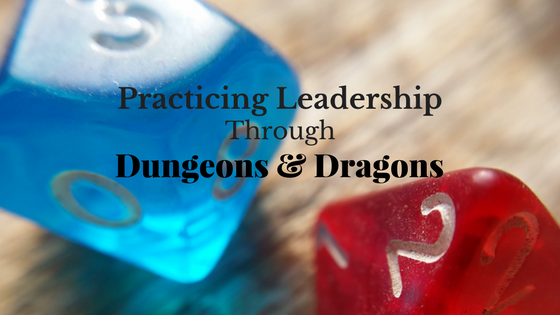How Dungeons & Dragons prepared Kane Hadley for taking on a team leadership role.
Practicing and honing your leadership skills in role-playing games can provide excellent practice for when you need them in your professional life.
My friend Kane Hadley shared with me recently that he’s taken on more project management and leadership responsibilities at his job. But he’s had no formal project management training.
“Everything I know about project management I experienced playing Dungeons and Dragons.”
Wow. I was intrigued and wanted to know more. Kane happily agreed to let me interview him and share his experience.
Note: I’ve edited this interview for space and clarity.
For context, what was your work experience to this point?
I studied computer science in college and originally wanted to make video games. Instead, I moved into artificial intelligence and security. I work with a software development team that works with research data.
How did you come to be in a team leadership role?
At times our Project Manager is away. In those situations, I take his role for a week or two. So though I’m not formally the project manager, it’s helpful to have someone still lead the team and communicate with stakeholders, and be in that role in his absence. And our project manager has taken on creating more documentation, so I’ve stepped into managing the development team a bit more.
Did you ever want to be a project manager?
I don’t think anyone ever plans to be a project manager when they’re in high school. I do think it’s common for teams to tag someone to handle the project management if they don’t have anyone in that formal role.
I know others who’ve also become the project manager that way. They become PMs because their teams need it. They’re often not given training, yet are expected to be able to do it. It’s thought that if you’ve managed software, you should be able to manage people, too. That’s not always true.
For those who aren’t familiar with Dungeons & Dragons, give a brief explanation.
Dungeons & Dragons (D&D) is a board game in which people play out a fictional world. Everyone acts out a character a and you all pretend to be on an adventure. There are 2 roles: the players and the Dungeon Master. I played the Dungeon Master.
The game is played over a long period of time through a series of individual games. The individual games can last anywhere from an hour to 4 hours or much longer even.
What do you do as the Dungeon Master?
The Dungeon Master (DM) creates the story and keeps things running smoothly. As DM, you want to make sure the players enjoy the game.
How has being Dungeon Master in D&D prepared you for leading your team?
The Dungeon Master has to take care of many things so that the players can enjoy the game.
The project manager also takes care of so many things the team may never be aware of. The team is shielded from this. It gives us the luxury to focus on developing the software.
When I first started taking on some of the project management responsibilities, I thought “Project management?! How hard can it be? I’ve seen people manage projects before!” You don’t realize until you’re in that role that they were doing a really good job to keep things running smoothly.
How did your role as Dungeon Master help you in your leadership role now?
Here are different things I needed to address as Dungeon Master, that apply to my project management experience today:
- Planning. When you play D&D you might be tempted to just say “Let’s play out the first session and figure out the rest as we go along.” But once you try that you realize why you need to plan things in advance. You need to figure out what needs to be done and how to get it done. You’ll run into 100 issues that you could have foreseen had you taken the time to think about it.
It’s the same with your project. You can’t just dive in without planning. You have to consider the potential hurdles up front.
- Structure. For D&D, you decide how long you want to play. A single session can last any amount of time, from 30 mins to 4 hours or more. You determine how long each session will last, and how long overall the entire game will last. For example, you could decide that you’d play for 12 months and meet once per week.
On our development team, we operate in an iterative style with two-week sprints. We have daily stand-ups and strive to deliver software each week if possible. We have laid out and agreed to a structure that we all follow.
- Strategy. In the game, instead of just letting things just go without any up-front strategy, I needed to have a better idea of where we were going. I needed to develop the characters and the world they were playing in. I needed to have some ideas of where things might need to go. I needed a more global perspective of what I had in mind for the game and the story.
This is the same for the project team. There’s a business need that we’re designing a solution for, and the team needs to have an idea of the overall strategy so they understand the perspective of the decisions that are made and the work that they’re doing. Knowing where we’re going helps us plan better and get there as a team.
Additionally, knowing the larger context helps with planning for integrations with other systems that we need to plan for. It’s not just our code we need to plan for, but the tasks to ensure it works well with other systems.
- Details and Distractions. In my role as Dungeon Master, I had to keep up with where the story was going and handle the details and make all this seamless so the players enjoy themselves and don’t notice all the work going into it.
It’s the same with managing the team. There are many events going on around the team that you don’t want them to get distracted by.
How else has being DM helped prepare you to lead your team?
It’s helped me understand a lot about communication and managing people.
My first session of D&D was a lot of fun from the players’ perspective. But from my perspective, it was a train wreck.
I had my story in mind but didn’t communicate it well. I expected to just say some things and the players would understand what I wanted them to do. Very quickly into the game, I realized they couldn’t read my mind and know where I wanted them to go. They were doing whatever they thought they could do and going in directions I hadn’t planned or wanted them to.
I realized I needed to be clear and communicate the direction so that everyone understood.
I need to communicate clearly with my project team, too. I want to encourage and empower them by giving them clear instructions on what’s needed. Yet I don’t want to micromanage them. I want them to feel empowered, but not like they can just go in any direction. There’s a balance.
If you micromanage, you get exactly what you want but the team loses morale. You want to give instructions in a way that they feel that they can do the work and have some buy-in and ownership also.
As Dungeon Master I also had to learn how to manage conflict among the characters. I’m glad I learned this in D&D so I can adapt it to my real world project and have a better understanding of how to handle those situations going forward.
Additionally, I learned about the need to motivate people. In D&D, you need to motivate your players to want to continue playing. It’s a long game and they could get bored or decide not to play anymore.
It’s the same with your team members. You want to motivate them to not just do their tasks, but you want them to do the work effectively and exceptionally.
You also want to give them the confidence to learn and grow. You want to bring the best out of your team.
Wow – I’d never considered role-playing games as a route to practicing leadership and project management.
Dungeons & Dragons forced me to put into practice most of what I’d already learned about project management yet only knew as ideas without experience.
D&D is low stakes – a game – so people will immediately become relaxed and comfortable instead of wary. Since you play the Dungeon Master role they’ll defer to you to lead the situation and give them cues. You’ll have plenty of project management and leadership experience from the game sessions:
- Want to bond with your children? Play a game where you get to play as heroes in the world and take on dragons!
- Want to become a better communicator? Play as Dungeon Master in a game crafted around social interactions.
- Want to get better at resolving conflict? As DM you’ll eventually need to resolve one if not more conflicts.
- Want to learn how someone who is great at resolving conflict does it? Watch someone who excels at this do so in a role-based game. They’ll still act out how they would in life except with a mask of a fictional character backstory.
- Want to learn how teams self-organize? Give them a situation larger than any of their characters. You’ll see who becomes a natural leader to guide the other players to a solution. You’ll also see how each person comes to the realization that their character can’t handle it alone and they have to put together their strengths to overcome the challenge.
Sounds like you’re off to a solid start as a great leader. How do you feel about project managers now that you’ve taken on some of that role?
Project managers are awesome. They make everyone’s life easier. They allow the people on the team to have a lot of fun. A project manager I once worked with told me that it was his job to make sure his team leaves every day at 5:00. If not, he’s failed. I’ve always remembered that. The project manager does a lot to make the team’s life much easier.
Suggested Articles:
If you’d like to read more on getting project management experience prior to getting a PM job, check out this post:
How to Get Project Management Experience Through Volunteer Work
If you’d like to read more on developing leadership skills at work right now, check out this post:




Thanks for writing this — I didn’t consider that something I do for fun in my free time could be relatable to a work setting.
The Real Person!
Author Leigh Espy acts as a real person and passed all tests against spambots. Anti-Spam by CleanTalk.
I never considered it until my friend said those words! Such a fun perspective! And glad to know it’s helpful. 🙂
Leigh
I love Leigh’s way of grabbing my attention!!! Leigh – GREAT perspective!! Thank you!
The Real Person!
Author Leigh Espy acts as a real person and passed all tests against spambots. Anti-Spam by CleanTalk.
Thanks, Clay! This was such a fun article to write! I’d have never considered this before my conversation with Kane. I loved his approach to his new leadership position.
Kane, I’d like to understand how a Dungeon Master approaches risk management.